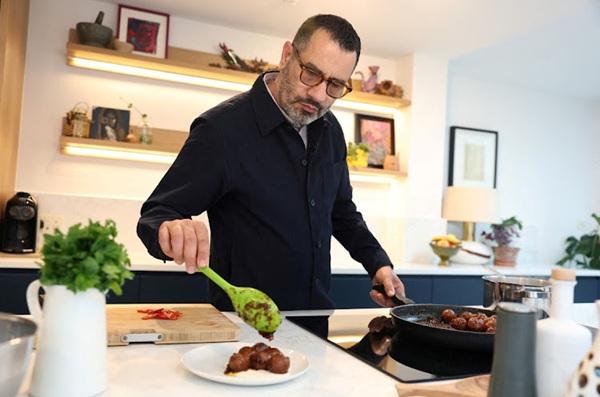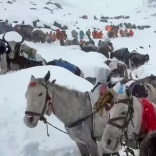Leonardo da Vinci's DNA found in 6 living relatives after 500 years
Sami Tamimi on Palestinian cooking and cultural preservation amid Gaza destruction

FILE - Palestinian-British chef, food writer and restaurateur Sami Tamimi prepares a dish from his new cookbook during an interview at his home in London on June 3 2025. [File photo: Toby Melville/Reuters]
The ongoing war in Gaza has destroyed much of its cultural heritage, but amid the rubble, one Palestinian staple endures: the common mallow plant.
The spinach-like leaf, which forms the basis of a traditional stew called khubeze that has helped many Gazans stave off hunger, is one of many native plants at the centre of Palestinian cuisine.
Sami Tamimi, the acclaimed Palestinian chef who comprises half the duo behind the popular Ottolenghi deli and restaurant empire (the other half is his fellow Jerusalemite and business partner, Israeli chef Yotam Ottolenghi), paid tribute to the culinary tradition of “farming and foraging and eating what is growing in your backyard” in his cookbook Boustany (“My Garden” in Arabic) which will be released in the US on July 15.
The timing is poignant. In a recent conversation with Reuters, Tamimi emphasised the importance of promoting and preserving the Palestinian people’s rich culinary heritage, not only amid the destruction of Gaza, but in the face of what he sees as the longstanding appropriation of traditional Palestinian dishes.
Some Israeli culinary historians said staples such as hummus, falafel and za’atar are as central to Middle Eastern Jewish cooking as they are to the Arab kitchen. While Tamimi acknowledges some dishes are shared by different traditions, he argued too often the Palestinian history is erased.
The conversation has been edited for length and clarity.
Palestinian cuisine has surged in popularity in recent years, in part because chefs including you have made it more accessible. What do you make of its rise?
Tamimi: It wasn’t deliberate. I wanted to promote our food, the culture, the stories behind it, where it all comes from, the whole connection to the land, all of which I felt, amid the war, was getting slightly lost.
The thing that winds me up is seeing so many Israeli restaurants opening in the UK, Europe and America that are basically selling our food in the name of Israeli new cuisine. What they do is take a dish and take it out of context. They don’t have any backstory about where this dish comes from, what kind of tradition is behind it. It gets worse when they don’t bother to change the name of the dish.
Maklouba, traditional Palestinian dish of layered rice, meat and vegetables that is flipped before serving, earning its name meaning “upside down” in Arabic, appears on menus as maklouba. Mujadara, a popular Levantine dish of lentils, rice and crispy onions, is mujadara. I’m not saying all the dishes are Palestinian, but they have their own history and heritage and rituals, and claiming all that I find frustrating.
Food is as cultural as it is political in the Israeli-Palestinian context. Do you see the growing prominence of Palestinian cuisine as part of an effort to preserve Palestinian culture, or assert ownership?
Luckily, we have some talented chefs who are pushing the boat towards preserving and putting our food under the limelight in a good way. However, it took a long time because, coming out of trauma, people are focusing on other things to rebuild and preserve. Food was the last bit.
When did you realise you wanted to be a chef?
I was quite young. I went to work in a hotel in West Jerusalem where I was going to help clean the kitchen, and it opened a new world to me. When I told my family I’m thinking about cooking, they all dismissed it. My father said: ‘Are you crazy? This is a job for a woman.’ It went on like this for so long.
My family owned a transport company. It used to be huge before the Second Intifada closed it. My father kept driving a bus because he wanted to be out with people. After you are born, if you’re a boy, your family has a plan for you and I didn’t fit in the plan because I wanted to do things my way.
Were you always drawn to Palestinian food, specifically?
From a young age I wanted to learn other cuisines. Later, when I moved to Tel Aviv, I realised the food that was important to me is Palestinian food. I didn’t want to do traditional Palestinian food because it takes hours to make and there’s no market for it. It sounds horrible, but when you do traditional food like this in a restaurant, it’s a bit like peasant food. People don’t appreciate it.
I worked in a Californian grill place in Tel Aviv for a few years and started to combine bases of Palestinian food into new ingredients. It worked.
It was fun because I could stay true to a dish but kind of elaborate on it, and this became my style. I want to think if Israel didn’t occupy Palestine, Palestinian food would be evolving into something I do today.
In a way, your cooking is imagining a Palestinian cuisine unhindered by decades of displacement, destruction and occupation?
Yes. People were kicked out of their country, people were losing their homes. In that situation you stop and think, what are the things I can hold onto? Food was one of them.
How have other Palestinians responded to your work?
The older generation is probably more protective of the original recipes but the newer generation likes what I do. I get it quite a lot from young Palestinians where they say some recipes I do convey the flavour of what their mom cooks, but it takes a quarter of the time. I think the older generation will probably laugh at me. What mess are you making with our food. But the newer generation are accepting it.
Going back to the culinary fight over ownership, you’ve talked about the importance of giving context to Palestinian dishes. Was your intention with your 2020 cookbook Falastin (Arabic Palestine) to provide the backstory?
With Falastin I wanted to give thanks. I’ve been cooking for so many years and borrowing dishes from our repertoire as a Palestinian, and I wanted to stop and say thank you.
In the 1990s, we had a lot of books that talked about Mediterranean food and Middle Eastern food, and it’s a vast chunk of the world. Today the focus is about a certain place and its culture and the food. It’s a wonderful way to convey a lot of what I wanted to say about modern day Palestine. What I wanted to achieve from it was to interview real people who inspire me and who I thought will inspire other people.
How does Boustany differ from Falastin? Apart from it being your first solo cookbook, it’s comprised of vegetarian recipes, correct?
Vegan and vegetarian. The idea started from the Covid-19 lockdown. When you’re in a situation like lockdown, you get homesick because you want to be with your family and eat the food that brings you comfort. I wanted, in a way, to transport myself to being with my family back home. Because I couldn’t, I started cooking simple dishes like khubeze. It started with me writing the recipes and six months later I had 300.
Boustany is a bit more personal. I talk about myself and the family and the past. I didn’t go so much into politics. When October 7 [2023] happened, I was finalising everything. It’s so valid at the moment to talk about what’s happening, but I promised the publisher to do a slightly lighter weight book.
Amid the destruction of Gaza and deteriorating situation in the West Bank, do you feel pressure to ensure the preservation of Palestinian culinary heritage?
Definitely. As a Palestinian, seeing everything that’s happened, I’m doing my bit by introducing more people to the culture, the food, to what happened there. I feel the more we talk about it, the more we put it under the spotlight, the more positive things will happen.
I feel I have a responsibility, but I also feel bad because I’m away from home. It’s a price I have to pay because if I was in Jerusalem, I would never be where I am today because of its limitations. I’d probably be driving a bus.












Leave a Reply
Be the First to Comment!
You must be logged in to post a comment.
You must be logged in to post a comment.